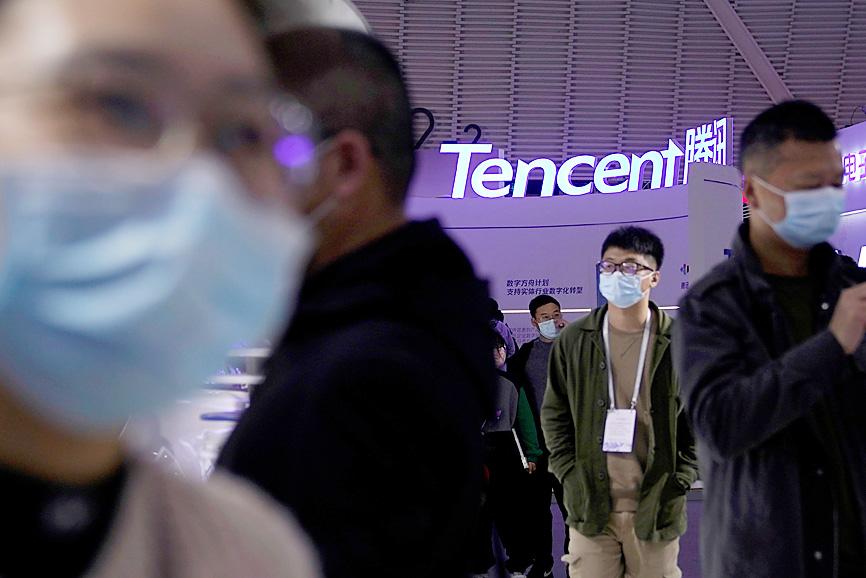Tencent Holdings Ltd (騰訊) founder Pony Ma (馬化騰) — the second-richest man in China — has met with Chinese antitrust regulators and agreed that his firm would be “as compliant as possible,” after rival technology giant Alibaba Group Holding Ltd (阿里巴巴) was battered by legal woes.
Tencent, which owns WeChat and a lucrative gaming empire, is the latest tech conglomerate to fall in the crosshairs of the regulators.
They have launched a blitz on apparent anticompetitive practices, threatening to slice up supersized firms whose reach now stretches into the daily finances of the Chinese public.

Photo: Reuters
Last week, they summoned 11 tech firms for talks on cybersecurity.
Ma said that he would “actively cooperate with regulatory authorities and be as compliant as possible” during a news briefing on Wednesday on Tencent’s annual results, Chinese financial news Web site Yicai reported.
Tencent president and chief executive director Martin Lau (劉熾平) also said that he had met with the Chinese government several times to discuss antitrust efforts and hoped to create a “healthy environment” to foster innovation.
Lau acknowledged that companies like Tencent tread a fine line between public duty and profit motive as they get larger, but the “boring answer” was to remain compliant and stay in touch with the government.
Asked whether Tencent’s core gaming and entertainment businesses might attract antitrust regulators’ attention, company executives pointed to the sheer number of competitors.
That was in contrast with a quarter earlier, when they stressed that new antitrust rules focused more on transaction-based platforms than on Tencent’s entertainment businesses.
“We have always been very focused on compliance, and we will continue to operate strictly in compliance with the rules and regulations,” Lau told reporters on a conference call.
Any requirements to form a financial holding company would not have an impact on its business, he added.
Tencent’s attempt to allay investor concerns over regulatory scrutiny comes after it posted revenue growth that barely met expectations.
Sales rose 26 percent to 133.7 billion yuan (US$20.46 billion) in the fourth quarter last year, versus a 133.1 billion yuan average forecast.
Net income was 59.3 billion yuan, with one-time gains contributing over half of its profit. That compared with the 32.9 billion yuan projected.
It is unclear how far Beijing intends to go in its bid to rein in Tencent and other technology companies.
In the short term, investors will likely focus more on how the world’s largest game publisher could sustain a COVID-19 pandemic-induced entertainment boom, while delving deeper into newer businesses like advertising and payments.
The company’s shares slumped 5 percent from US$80.93 to US$76.81 by close of trading on Wednesday.
Additional reporting by Bloomberg

Semiconductor shares in China surged yesterday after Reuters reported the US had ordered chipmaking giant Taiwan Semiconductor Manufacturing Co (TSMC, 台積電) to halt shipments of advanced chips to Chinese customers, which investors believe could accelerate Beijing’s self-reliance efforts. TSMC yesterday started to suspend shipments of certain sophisticated chips to some Chinese clients after receiving a letter from the US Department of Commerce imposing export restrictions on those products, Reuters reported on Sunday, citing an unnamed source. The US imposed export restrictions on TSMC’s 7-nanometer or more advanced designs, Reuters reported. Investors figured that would encourage authorities to support China’s industry and bought shares

FLEXIBLE: Taiwan can develop its own ground station equipment, and has highly competitive manufacturers and suppliers with diversified production, the MOEA said The Ministry of Economic Affairs (MOEA) yesterday disputed reports that suppliers to US-based Space Exploration Technologies Corp (SpaceX) had been asked to move production out of Taiwan. Reuters had reported on Tuesday last week that Elon Musk-owned SpaceX had asked their manufacturers to produce outside of Taiwan given geopolitical risks and that at least one Taiwanese supplier had been pushed to relocate production to Vietnam. SpaceX’s requests place a renewed focus on the contentious relationship Musk has had with Taiwan, especially after he said last year that Taiwan is an “integral part” of China, sparking sharp criticism from Taiwanese authorities. The ministry said

US President Joe Biden’s administration is racing to complete CHIPS and Science Act agreements with companies such as Intel Corp and Samsung Electronics Co, aiming to shore up one of its signature initiatives before US president-elect Donald Trump enters the White House. The US Department of Commerce has allocated more than 90 percent of the US$39 billion in grants under the act, a landmark law enacted in 2022 designed to rebuild the domestic chip industry. However, the agency has only announced one binding agreement so far. The next two months would prove critical for more than 20 companies still in the process

CHANGING JAPAN: Nvidia-powered AI services over cellular networks ‘will result in an artificial intelligence grid that runs across Japan,’ Nvidia’s Jensen Huang said Softbank Group Corp would be the first to build a supercomputer with chips using Nvidia Corp’s new Blackwell design, a demonstration of the Japanese company’s ambitions to catch up on artificial intelligence (AI). The group’s telecom unit, Softbank Corp, plans to build Japan’s most powerful AI supercomputer to support local services, it said. That computer would be based on Nvidia’s DGX B200 product, which combines computer processors with so-called AI accelerator chips. A follow-up effort will feature Grace Blackwell, a more advanced version, the company said. The announcement indicates that Softbank Group, which until early 2019 owned 4.9 percent of Nvidia, has secured a